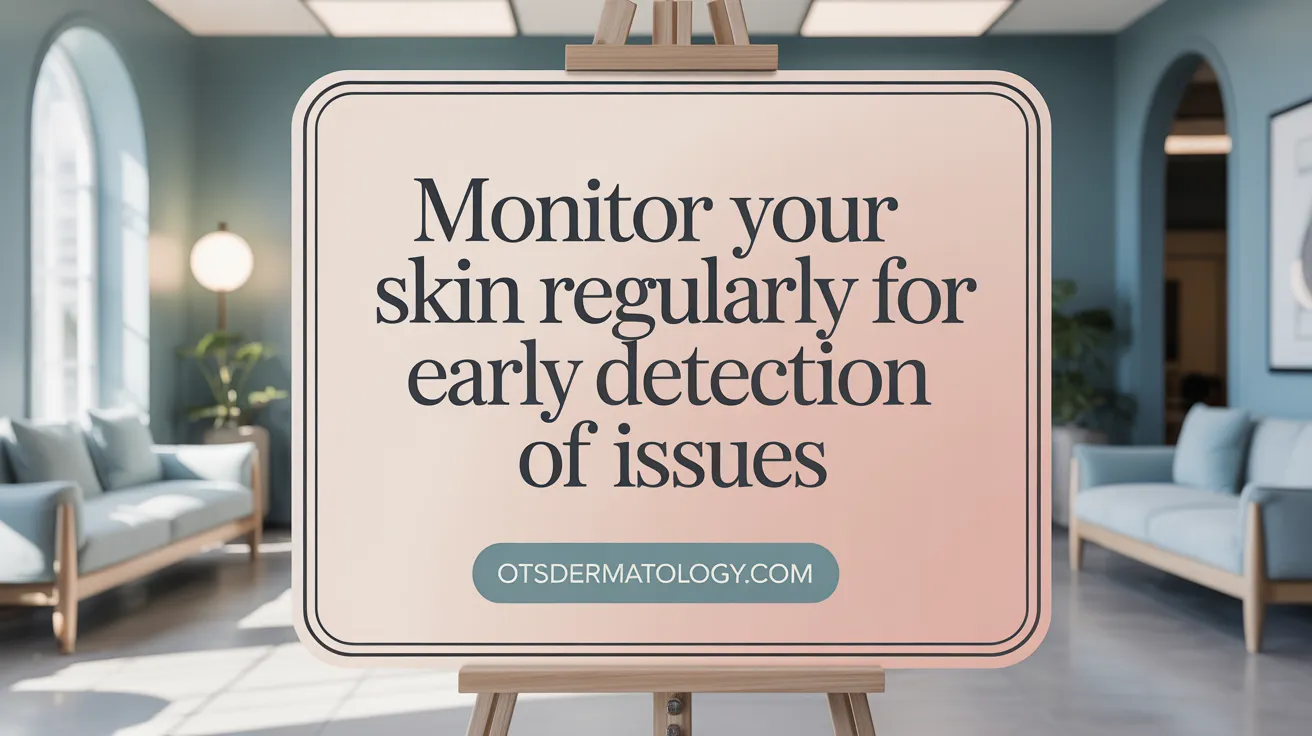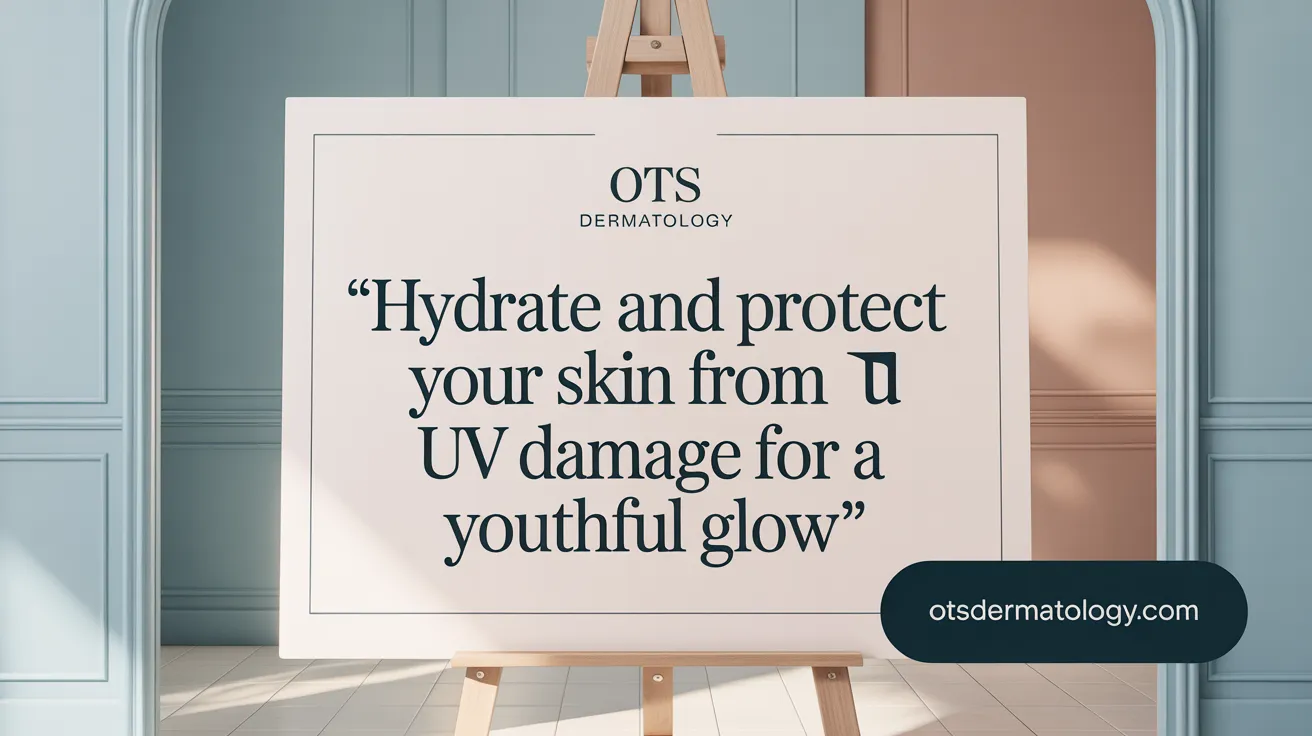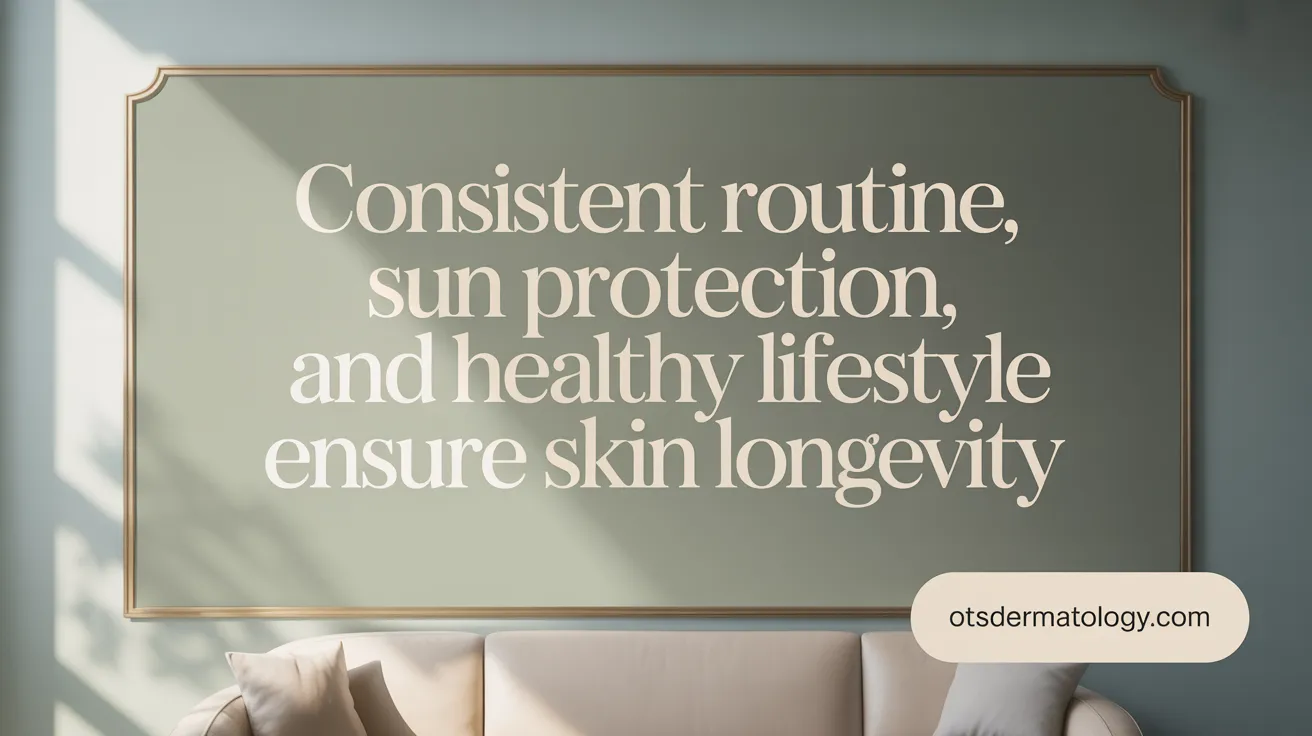Why Preventive Dermatology Matters
Healthy skin is not just about appearance; it's a vital barrier protecting us from environmental hazards and maintaining overall wellness. Adopting preventive dermatology strategies early and maintaining them throughout life can significantly reduce the risk of skin problems, premature aging, and skin cancer. This article outlines expert advice, core principles, and practical tips for sustaining skin health at every stage of life, empowering readers to nurture skin that lasts a lifetime.
Core Principles and Strategies for Lifelong Skin Health

What are the core principles and strategies for lifelong skin health and prevention?
Maintaining healthy skin over the years involves consistent and simple habits that protect, nourish, and monitor your skin. A fundamental practice is gentle cleansing followed by proper moisturizing. Using products suitable for your skin type and avoiding harsh soaps or scrubbing helps keep your skin barrier intact.
Sun protection plays a critical role. Applying a broad-spectrum sunscreen with SPF 30 or higher every day shields your skin from harmful UV rays, which can cause premature aging and skin cancer. Reapplying sunscreen during prolonged outdoor activity is equally important.
A balanced diet rich in fruits, vegetables, lean proteins, healthy fats, and antioxidants supports skin repair and slows aging. Staying well-hydrated by drinking plenty of water enhances skin elasticity and healing.
Avoiding harmful behaviors such as smoking, which accelerates skin aging and increases cancer risks, and minimizing sun exposure—even on cloudy days—are protective measures. Tanning beds should be completely avoided, as UVA radiation causes significant skin damage.
Regular skin self-exams enable early detection of unusual moles, spots, or changes, which is vital for catching skin cancer early. Complementing self-awareness with periodic evaluations by a dermatologist ensures proper diagnosis and treatment if needed.
Beyond skincare, lifestyle factors like adequate sleep, stress management through activities like meditation, exercise, and social engagement, further contribute to healthy skin.
In summary, lifelong skin health hinges on daily gentle skincare, consistent sun protection, a nutritious diet, lifestyle choices that reduce inflammation, and routine monitoring. These combined efforts maintain the skin’s resilience, youthful appearance, and overall well-being.
Expert Skincare Routine Tips to Prevent Skin Issues

What expert tips and advice can help establish effective skincare routines to prevent skin issues?
Creating a well-rounded skincare routine is essential for maintaining healthy skin and preventing common problems. Experts recommend washing your face twice daily—morning and evening—with gentle cleansers that suit your skin type, whether oily, dry, sensitive, or normal. Avoid hot water and harsh soaps, which can strip natural oils and cause dryness or irritation.
Moisturizing immediately after cleansing helps lock in hydration. Choose a moisturizer appropriate for your skin—fragrance-free, creamy types for dry skin, or lighter gels for oily or sensitive skin—and apply on slightly damp skin to maximize absorption.
Sun protection is a cornerstone of prevention. Use a broad-spectrum sunscreen with SPF 30 or higher daily, even on cloudy days, and reapply every two hours when outdoors. Seek shade during peak UV hours, wear protective clothing, and don a wide-brimmed hat and UV-protective sunglasses to shield your skin from harmful rays.
Avoid detrimental habits like smoking, which accelerates skin aging, damages collagen, and increases skin cancer risks, especially on the lips. Managing stress through sufficient sleep, physical activity, meditation, and social engagement can enhance skin health by reducing inflammation.
Regularly perform skin self-exams, looking for moles or spots that are changing, itchy, or bleeding. Consulting a dermatologist for routine checkups or if any unusual changes occur can lead to early detection of skin cancer.
Maintaining a balanced diet rich in fruits, vegetables, whole grains, and lean proteins supplements your skin’s health. Staying well-hydrated also helps preserve skin elasticity and reduces dryness.
For optimal results, select skincare products formulated for your specific skin type and concerns, and avoid improper practices like over-scrubbing or using harsh exfoliants. This gentle approach prevents irritation and maintains the skin’s natural barrier.
In summary, consistent cleansing, proper moisturizing, diligent sun protection, avoiding harmful habits, healthy lifestyle choices, and personalized product use collectively foster resilient, youthful skin and significantly lower the risk of skin issues.
Adapting Preventive Skincare Across Life Stages

How can preventive skincare measures be adapted to maintain healthy skin across different life stages?
Skincare needs change as we age, and adopting appropriate routines at each stage helps maintain skin health and prevent issues like aging, sun damage, and skin conditions.
In infancy and childhood, gentle cleansing with mild, fragrance-free products and regular sun protection with mineral-based sunscreens are vital. Limiting bath time to avoid dryness and using a moisturizer suitable for sensitive skin helps preserve skin moisture.
Teenagers should focus on regular cleansing to manage oil and prevent acne. Using broad-spectrum sunscreen daily and avoiding harsh astringents or toners helps protect the skin and prevent scarring. Building good habits early sets the stage for lifelong skin health.
In your 20s to 40s, protecting collagen becomes a focus. Daily application of broad-spectrum SPF 30 or higher, combined with antioxidants like vitamin C, helps combat UV damage and signs of aging. Incorporating gentle exfoliants and retinoids can improve skin renewal and reduce early wrinkles.
As skin matures in the 50s and beyond, increased hydration is crucial. Switching to richer, more emollient moisturizers and continuing diligent sun protection helps address dryness and sensitivity. Treatments like chemical peels, laser therapy, or fillers may be suitable for correcting age-related changes. Regular checkups become especially important for early detection of skin cancers.
Across all ages, a balanced diet rich in fruits, vegetables, and lean proteins supports skin health. Avoiding harmful habits such as smoking and excessive alcohol consumption also slows skin aging.
Consistent routines combined with professional advice from dermatologists tailored to each age group ensure optimal skin care. This lifelong approach helps protect against environmental factors, reduces aging signs, and promotes a healthy, radiant complexion.
| Life Stage | Focused Skincare Practices | Additional Recommendations |
|---|---|---|
| Infants & Children | Mild cleansers, mineral sunscreens, limited bath time | Educate children on sun safety and hygiene |
| Teenagers | Acne management, daily sunscreen, avoiding harsh products | Develop healthy skincare habits early |
| 20s-40s | SPF, antioxidants, gentle exfoliation, retinoids for aging signs | Focus on collagen preservation and skin renewal |
| 50s & beyond | Hydration, rich moisturizers, continued sun protection, aging treatments | Regular skin exams, consider advanced treatments |
Following age-appropriate skincare routines, practicing sun safety, and consulting dermatologists build a foundation for resilient, healthy skin throughout life.
Optimal Practices for Sun Protection, Moisturizing, and Anti-Aging Care

What are the best practices for sun protection, moisturizing, and anti-aging skincare?
To maintain healthy, youthful skin, it is essential to adopt a comprehensive skincare routine focused on protection and hydration. Regularly applying a broad-spectrum sunscreen with SPF 30 or higher is the first line of defense against UV rays that cause skin aging and skin cancer. This sunscreen should be applied every morning before outdoor activities and reapplied approximately every two hours when exposed to the sun.
Choosing sunscreens that provide protection against both UVA and UVB rays, whether physical or chemical formulations, helps prevent premature wrinkles, age spots, and damage. For added defense, wear protective clothing such as wide-brimmed hats, sunglasses, and long-sleeved garments, especially during peak UV hours.
Immediately after cleansing, applying a suitable moisturizer helps lock in hydration and strengthens the skin barrier. For best results, select products formulated for your specific skin type—whether oily, dry, sensitive, or normal. This step supports skin elasticity and reduces dryness, which accelerates aging.
Incorporating anti-aging ingredients like retinoids, hyaluronic acid, antioxidants (vitamin C and E), and ceramides enhances skin repair, boosts collagen production, and reduces signs of aging. Regular use of these targeted treatments can diminish fine lines, improve skin tone, and brighten the complexion.
Alongside topical treatments, protective strategies such as avoiding the sun during peak hours, seeking shade, and wearing protective clothing further shield skin against harmful UV exposure. Additionally, antioxidants in skincare or diet help neutralize free radicals caused by UV rays, adding an extra layer of defense.
Consistent practice—combined with patience—can lead to noticeable improvements in skin texture, firmness, and overall appearance. Remember, gradual and modest results are typical with over-the-counter products, and professional guidance from a dermatologist can optimize your skin health plan.
The Impact of Lifestyle Factors and Educational Guidance on Skin Health
 How do lifestyle factors influence skin health, and what educational guidance supports positive habits?
How do lifestyle factors influence skin health, and what educational guidance supports positive habits?
Lifestyle choices play a crucial role in maintaining healthy, youthful skin. A balanced diet rich in fruits, vegetables, whole grains, and lean proteins supplies essential nutrients and antioxidants that help combat free radicals and reduce inflammation. This dietary approach supports collagen production and skin resilience. Proper hydration, through drinking water and consuming water-rich foods, keeps the skin plump and elastic while preventing dryness and sagging.
Adequate sleep is vital for skin repair and regeneration, enabling the body to produce collagen and repair damage from environmental exposure. Managing stress effectively—via practices like meditation, exercise, or social activities—reduces the production of stress hormones that can worsen skin conditions such as eczema, psoriasis, and acne.
Conversely, avoiding harmful habits such as smoking accelerates skin aging, damages collagen and elastin fibers, and increases the risk of lip and skin cancers. Excessive alcohol consumption promotes inflammation and impairs skin healing. Environmental factors like pollution and UV exposure can cause oxidative stress and premature aging, making sun protection and pollution avoidance essential.
Educational guidance should emphasize the importance of healthy lifestyle habits. This includes teaching the benefits of a nutritious diet, consistent use of broad-spectrum sunscreen, stress management techniques, and avoiding environmental hazards. Encouraging regular skin self-exams and professional skin checks also helps detect early signs of skin cancer.
By fostering awareness about these factors, individuals can adopt protective behaviors that preserve skin health long-term, preventing premature aging and inflammatory conditions. In conclusion, integrating education on balanced nutrition, sun safety, lifestyle moderation, and environmental awareness is fundamental for promoting effective skin health and resilience.
Preventive Dermatology Best Practices to Avoid Common Skin Problems

What are the best practices in preventive dermatology to avoid common skin problems?
Preventive dermatology focuses on actions and habits that protect skin health and prevent issues such as skin aging, irritation, and skin cancer. One of the most effective practices is performing regular skin self-examinations. These help detect early signs of skin problems, especially new or changing moles, spots, or patches that may indicate skin cancer.
Daily sunscreen application is crucial. Use a broad-spectrum sunscreen with SPF 30 or higher, and remember to reapply every two hours when outdoors. Covering the skin with protective clothing such as long-sleeved shirts, wide-brimmed hats, and UV-protective sunglasses reduces UV exposure. Additionally, seeking shade during peak UV hours from 10 a.m. to 4 p.m. is strongly recommended.
Maintaining good skin hygiene by gentle cleansing, avoiding harsh soaps, and not scrubbing skin vigorously helps preserve the skin barrier. Avoiding skin irritants like fragrances and preservatives in cosmetics also supports overall skin health. It's important to steer clear of harmful habits like tanning beds, which significantly increase the risk of skin cancer, as well as smoking and excessive alcohol consumption, which can accelerate skin aging and exacerbate skin conditions.
Managing environmental influences by staying out of direct sunlight and keeping skin moisturized with suitable products helps prevent dryness and irritation. Regular visits to a dermatologist are advised, especially if you notice suspicious changes or have a family history of skin cancer. Combining these practices—protection, early detection, and lifestyle choices—forms the foundation of effective preventive dermatology, safeguarding the skin against damage and promoting a youthful, healthy appearance.
Sustaining Durable and Healthy Skin with Long-Term Skincare Habits

What long-term skincare tips promote durable and healthy skin?
Achieving and maintaining healthy, durable skin requires consistent care and attention. A foundational practice is to establish a daily routine that includes gentle cleansing suitable for your skin type, followed by consistent moisturizing to keep skin hydrated. Use a broad-spectrum sunscreen with SPF 30 or higher every day, regardless of the weather, to impede UV damage, slow aging, and reduce skin cancer risk.
Avoid harmful habits such as smoking, which accelerates skin aging and damages collagen and elastin fibers, leading to dullness and increased skin cancer risk. Manage stress through adequate sleep, physical activity, and relaxation techniques like meditation, as stress can trigger or worsen skin conditions such as eczema, psoriasis, and acne.
Support your skin’s health from the inside out by maintaining a balanced diet rich in fruits, vegetables, whole grains, and lean proteins. Adequate water intake helps sustain skin hydration and improves overall skin resilience.
Regularly observe your skin for any changes like new or evolving spots, colors, or textures. Early detection of skin irregularities enhances the chances of successful treatment. Schedule professional skin examinations, especially if you notice suspicious moles or persistent skin concerns.
Protect your skin from environmental harm by dressing appropriately with protective clothing and seeking shade during peak UV hours. Instead of tanning beds or sunbathing, opt for self-tanners if you desire a bronzed appearance. These measures help prevent premature signs of aging and damage.
Over time, as your skin ages and environmental conditions change, adapt your skincare routine accordingly. Increase hydration with richer moisturizers if your skin becomes drier, and consider incorporating anti-aging ingredients like retinoids or antioxidants to support collagen production. Regularly updating your regimen ensures ongoing skin vitality and minimizes the visible effects of aging.
In summary, long-term skin health stems from daily protective and nourishing habits, periodic skin checks, and making regimen adjustments as needed. These practices build a resilient skin barrier, preserve youthful appearance, and reduce the risk of serious skin diseases.
Embracing Preventive Dermatology for Lifelong Skin Vitality
Achieving and maintaining healthy skin that lasts a lifetime requires a proactive and comprehensive approach grounded in preventive dermatology. By embracing daily gentle care routines, rigorous sun protection, mindful lifestyle choices, and routine dermatological monitoring, individuals can protect their skin from premature aging, damage, and disease. Tailoring skincare strategies to life’s stages, educating oneself on healthy habits, and avoiding harmful behaviors further empower sustained skin health. Ultimately, investing time and effort in prevention today ensures resilient, radiant skin well into the future, supporting overall wellness and confidence.
References
- Skin care: 5 tips for healthy skin
- 10 skin care secrets for healthier-looking skin
- Routines to adopt at any age for a lifetime of healthy skin
- Skincare Tips for a Lifetime of Healthy Skin
- Essential Skincare Tips for Your Family
- What doctors wish patients knew about maintaining healthy ...
- Do You Really Need a Skin Care Routine?
